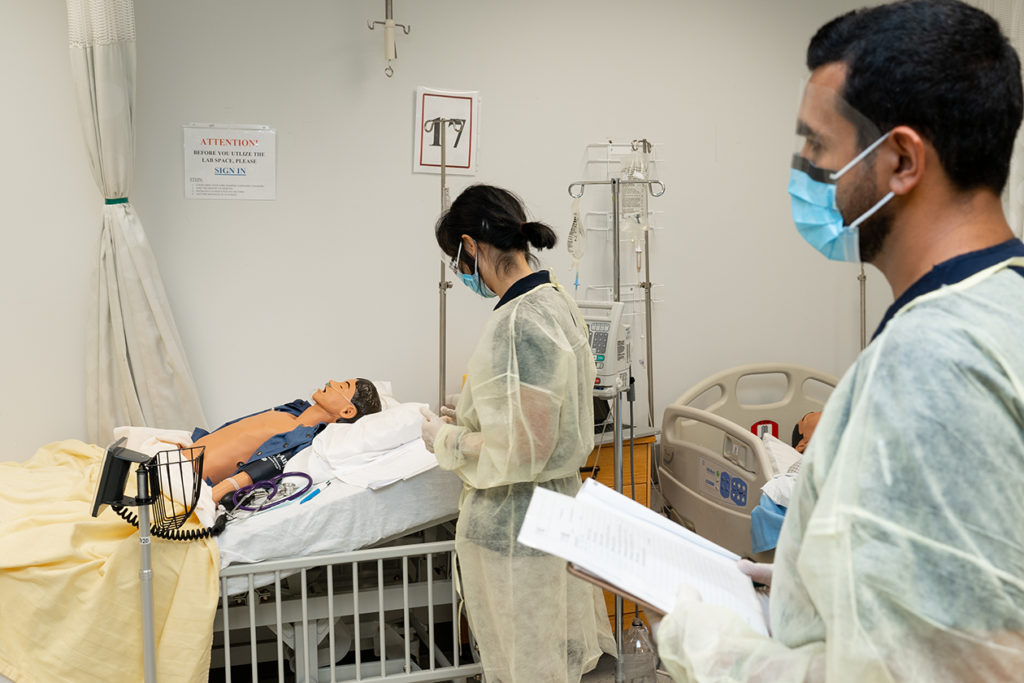Master of Science in Nursing (MScN)
Core Courses
- NURS 5100 3.0: Theoretical and Philosophical Foundations of Nursing Science
- NURS 5200 3.0: Qualitative Research Methods in Nursing
- NURS 5300 3.0: Quantitative Research Methods in Nursing Science
- NURS 5400 3.0: Advanced Nursing Practicum
- NURS 5500 3.0: Nursing Research Development and Knowledge Mobilization
- NURS 5725 3.0: Data Analysis and Interpretation (Effective Fall 2023, this course will replace NURS 5750 3.0 or NURS 5700 3.0)
Electives
- Three half-courses at the graduate level, of which at least two are inside nursing
Available to academically strong students, with an identified faculty member who is appropriate and available to supervise the student.
Core Courses
- NURS 5100 3.0: Theoretical and Philosophical Foundations of Nursing Science
- NURS 5200 3.0: Qualitative Research Methods in Nursing
- NURS 5300 3.0: Qualitative Research Methods in Nursing Science
- NURS 5725 3.0: Data Analysis and Interpretation (Effective Fall 2023, this course will replace NURS 5750 3.0 or NURS 5700 3.0)
- NURS 5400 3.0: Advanced Nursing Practicum
Electives
- One half-course, inside nursing, at the graduate level
Thesis
- NURS 6100: Thesis
Colloquium
- The non-credit colloquium course, NURS 6300: Expressions of Nursing Scholarship, is compulsory for all MScN candidates and is taken concurrently with NURS 6100: Thesis.
Primary Health Care Nurse Practitioners (PHCNP)
Prior to beginning the PCHNP courses, students must successfully complete 12 core credits from the MScN program (NURS 5100 3.0: Theoretical and Philosophical Foundations of Nursing Science, NURS 5200 3.0: Qualitative Research Methods in Nursing Science, and NURS 5300 3.0: Quantitative Research Methods in Nursing Science). The PHCNP program requires the completion of 7 PHCNP courses, two of which are offered online, four require seminar attendance at York, and five require clinical placements, which will be held in the GTA. Attendance is mandatory for seminars and clinical placements.
Five graduate core courses are as follows:
- NURS 5100 3.0: Theoretical and Philosophical Foundations of Nursing Science
- NURS 5200 3.0: Qualitative Research Methods in Nursing
- NURS 5300 3.0: Quantitative Research Methods in Nursing
- NURS 5880 0.0: Practice-based Research Proposal (PRP)
- NURS 5725 3.0: Data Analysis and Interpretation (Effective Fall 2023, this course will replace NURS 5750 3.0 or NURS 5700 3.0)
To complete the PHCNP: 12 Core Credits from the MScN Program and the following must be fulfilled:
Seven graduate core NP courses offered through the COUPN consortium:
- NURS 5810 3.0: Pathophysiology for Nurse Practitioners
- NURS 5820 3.0: PHCNP Roles and Responsibilities
- NURS 5830 3.0: Advanced Health Assessment and Diagnosis I
- NURS 5840 3.0: Advanced Health Assessment and Diagnosis II
- NURS 5850 3.0: Therapeutics in Primary Health Care I
- NURS 5860 3.0: Therapeutics in Primary Health Care II
- NURS 5870 6.0: Integrative Practicum in Primary Health Care
Additionally, students have to take the non-credit course NURS 5880 0.0: Practice-based Research Proposal (PRP), which provides students with the opportunity for a critical and analytic reflection on a topic/issue/problem related to the student’s practicum experience. Students will be supervised in the preparation of a research proposal by graduate faculty members in the School of Nursing at York University. Full–time students will complete the program in 6 consecutive semesters and part-time students in three to four years, depending on course load. Graduates are eligible to write the Canadian Nurse Practitioner Exam Examination: Family/All Ages to qualify as an NP–PHC.
PhD in Nursing Program
Courses: Students are required to complete a minimum of 18 credits in the first two academic calendar years (5 terms) of the doctoral program:
- Required (12 credits): GS/NURS 7000 6.0 – Philosophical Foundations of Contemporary Nursing Science; GS/NURS 7005 6.0 – Research Approaches in Nursing Science
- Electives (6 credits): Two 3-credit electives at the graduate (Master’s or PhD) level, inside or outside Nursing. Electives will be chosen by the student in consultation with her/his supervisor
- Required non-credit courses: GS/NURS 7015 0.0 – Doctoral Seminar Year I; GS/NURS 7020 0.0 – Doctoral Seminar Year II
GS/NURS 7105 0.0 - PhD Comprehensive Examination and Dissertation Proposal Defense
The PhD Comprehensive Examination and Dissertation Proposal Defense is conducted after the successful completion of the coursework and must be done within 28 months after starting the program.
Dissertation GS/NURS 7100 0.0 – Dissertation
The dissertation will normally take four to six terms (two calendar years) and involves:
- completion of independent, original research that makes a contribution to nursing scholarship in the student’s area of focus
- the preparation of a traditional dissertation or equivalent (i.e., three publication-quality papers)
- the successful completion of an oral examination
The following faculty members are available to be Principal Supervisors of PhD students:
- Lillie Lum
- Mahdieh (Fay) Dastjerd
- Mary Fox
- Elsabeth Jensen
- Christine Jonas-Simpson
- Nazilla Khanlou
- Christine Kurtz-Landy
- Tsorng-Yeh Lee
- Judith MacDonnell
- Eva Peisachovich
- Mina Singh
- Cheryl van-Daalen Smith
Please note that graduation from the Ph.D. program in Nursing does not confer status as a Registered Nurse in the Province of Ontario. For more information please visit the College of Nurses of Ontario website cno.org

Learn More
The Graduate Program in Nursing at York is an exciting environment to pursue innovative, socially engaging, career-ready education. Contact our Graduate Program Assistant to learn more.



